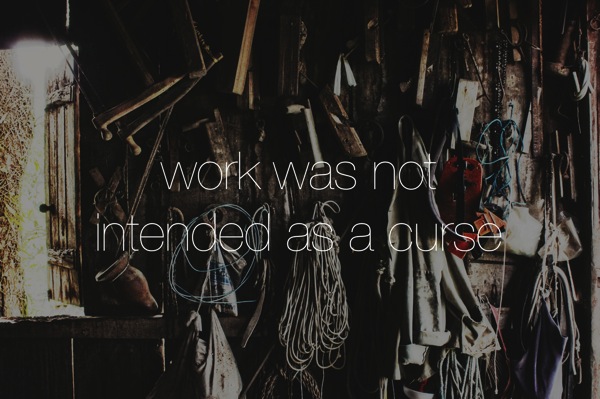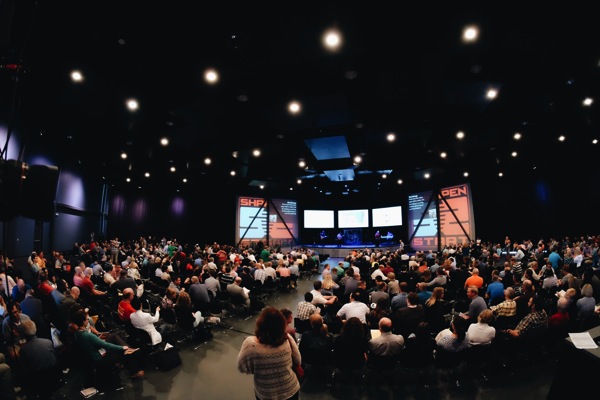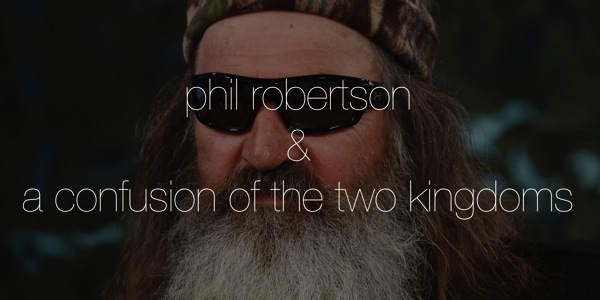I’m no expert in building houses, but in my limited knowledge of house building I know that the beginning of the building process is very unsexy.
 Do you ever have one of those days? Those days were work just seems to drag on. The day where the TPS reports are killing you and your sick of being told you have a “case of the mondays.” I’m not sure there is such a thing as a job where you don’t have those days.
Do you ever have one of those days? Those days were work just seems to drag on. The day where the TPS reports are killing you and your sick of being told you have a “case of the mondays.” I’m not sure there is such a thing as a job where you don’t have those days.
Because work is hard.
Work is hard because we often have bosses that are difficult to deal with. Or co-workers we can’t stand. Maybe we have a deadline that is fast-approaching. Or maybe even clients that have unrealistic expectations.
Work is tiring and exhausting. And not only that but for many of us, work follows us home. And this happens with all work - even the most appealing, perfect, dream-jobs.
But there’s an important reminder for all of us in the midst of these days. Work was never intended to be a curse. Work was actually intended to be a gift for man. A calling for man to fulfill in paradise.
“The book of Genesis leaves us with a striking truth-work was part of paradise.” - Tim Keller, Every Good Endeavor
But then sin enters the picture. Sin is the reason that both our perfect jobs and our less-than-perfect ones are hard work. Sin is the reason why our work follows us home. Sin is the reason why we have to work jobs just to make ends meet. Sin turns a calling into an obligation.
“Because you have listened to the voice of your wife and have eaten of the tree of which I commanded you, ‘You shall not eat of it,’cursed is the ground because of you; in pain you shall eat of it all the days of your life; thorns and thistles it shall bring forth for you; and you shall eat the plants of the field. By the sweat of your face you shall eat bread,till you return to the ground, for out of it you were taken; for you are dust, and to dust you shall return.” - Genesis 3:17-19
Work is a good thing. It is a gift from God. It is a part of the way that God has wired humanity to work. He has created us and called us to work in the various spheres of our life. But with sin, our callings also become laborious. Our gift also brings pain.
In Jesus, we have hope that this is not the way things should be or the way that things will always be. And we have hope that our work doesn’t define us. And while we face the pain of hard work, we can with faith look to the pain of the cross and be reminded of what sin does. It brings about a curse that affects every area of our life - our relationships, our homes, and our workplaces. And it’s a curse that can only be solved by a cross.
 [This post is a part of the WikiConference 2014 series of posts]
[This post is a part of the WikiConference 2014 series of posts]
Jon Acuff is the New York Times Bestselling author of four books including his most recent, Start: Punch Fear in the Face, Escape Average & Do Work that Matters. In addition, he’s become a social media expert with blogs that have been read by 4 million people and more than 215k twitter followers.
We live in a changing world. The world our kids are growing up in is far different than the world that we grew up in. Technology and the rate of change is speeding up at an alarming rate. Imagine having to grow up with social media around?
Change can be either overwhelming or an opportunity.
For leaders change is an opportunity to grow. But if we want to be a part of the change that is happening around us, we have to have grit.
Bravery + Empathy + Hustle = Grit
Bravery
Bravery is being stubborn in the face of fear. Often for us we enjoy watching other people have bravery, but avoid it for ourselves. Being afraid isn’t failure, staying afraid is.
For leaders this is difficult because we have big fears. The bigger the story, the bigger the dragon. The bigger the purpose, the bigger the fear. And these fears often come from an unhealthy need to compare yourself to others.
"God is not surprised or disappointed by the size of your ministry."
Because of social media, it has become so easy to compare yourself. Don’t focus so much on what god is doing in other people’s church that you fail to focus on what he is doing in your own.
Be brave. Be brave enough to be bad at starting something new and be brave enough to ask hard questions.
Empathy
Empathy is understanding what someone needs and acting on it. There are two parts to this equation: understanding and actually doing something. Both are important. You can’t have empathy if you don’t actually understand others. And you don’t have empathy if your understanding doesn’t lead to action.
If you want to be empathetic, the way you do so is simple.
- Read less minds.
- Ask more questions.
- Be human.
Choosing empathy is cheap; losing empathy is expensive.
Hustle
Hustle is doing the important things others don’t to enjoy the results that others won’t. In Colossians 3:23 Paul writes, "Whatever you do, work at it with all your heart, as working for the Lord.” If you want to do things that no one else is doing, you are going to have to work hard when others aren’t.
But also realize in the midst of the hustle, there are seasons.
There are times when we are tempted to let our families get the rest of me and not the best of me. Don’t sacrifice your family for your ministry. Don’t let your church steal your family’s Christmas.
Hustle makes you step into the tension of yes and no. Hustle harder and do the important things no matter how big or small because there’s no such thing as a small yes when you are talking about a big God.
 [This post is a part of the WikiConference 2014 series of posts]
[This post is a part of the WikiConference 2014 series of posts]
Polly lives in Dallas/Ft Worth, Texas with her husband, twin teenage daughters and her corgi, Cowboy. She is the founder of We Are Cherished, a ministry that reaches out to women in the sex industry. Polly is passionate for women to know their true worth and value, discovering who they were created to be.
What are the first 3 words that pop into your head when you think of women and men that have been impacted by the sex industry?
The sex industry impacts people in our congregations. It impacts both men and women in our churches, including those who are in the sex industry and those who are consumers of it. As Christians we are called to create, to walk alongside, to disciple, and to love well.
Loving well hurts.
Polly’s desire in telling her story was to passionately call us as church leaders to love others extravagantly. There are people in our congregations who are dying inside. They are fearful to be honest about their struggles and their stories because of what people might think.
60 percent of men in our churches struggle with pornography, including pastors. It’s a hardcore addiction.
Polly shared her story out of the sex industry, which she also shares on her blog:
I graduated from high school and headed to college. For the first semester I was the art major who led my dorm in parent’s day activities. On the inside and in my “other life” I was a stripper. It gave me a sense that I was invincible. The men drooled over me! They wanted me and I could say “yes” or “no”. I had told myself I would be the one in control of the situation, and I definitely thought I was in control of the men. Dancing gave me a feeling of self worth in such a deceptive and destructive way I had no idea I was spiraling into a pit of hell. For two years I lived this life. Sleeping with countless men, failing out of college, and completely losing who I was and what I’d become, I hit the bottom and tried to commit suicide. I quit dancing, left college and moved out of state where I quickly learned that your problems follow you wherever you go.
By this time in my early twenties, I just wanted to be loved for who I was, not for who I was running from.
I was told about Jesus during those tumultuous years but did not listen. I hated God. What kind of God would allow these horrible things to happen to a child? So I shunned Him. After all of this Jesus Christ still wooed me. He pursued me. He loved me madly, even though the world looked at me and turned away ashamed. He was never ashamed of me. He knew me before I took my first breath. He knew the path I was going to take but still wanted me: shamed, sinful, lustful, and prideful me.
What is God’s calling for you when it comes to loving others affected by this issue? Christ’s love is not cautious, it’s extravagant. It’s not your job to save them, but it is your job to love them.
 [This post is a part of the WikiConference 2014 series of posts]
[This post is a part of the WikiConference 2014 series of posts]
Ian Morgan Cron is an author, speaker, Episcopal priest, psychotherapist, and retreat guide. He began our session with chanting and silence. Shalom means completeness, wholeness, or ultimate well-bing. We began the session chanting “shalom” and “amen.”
Over and over again, in story upon story, what Carl made evident is the importance of everything being about Jesus.
He started a “Jesus-study” with his non-Christian neighbors but not a bible study… eventually the non-believers suggested that they read the Bible to learn about Jesus.What if Jesus actually meant it when he said, “The field is ripe for harvest”?
Jesus has a lot of power and sometimes we forget that. We begin to think that the power resides in something else. We think that if we change our approaches we solve our problems. Instead we should trust in the power of Jesus.
The .000001% of Jesus that I know has completely changed my life. @carlmedearis #wiki14
— Seth Hinz (@sethhinz) September 24, 2014
The slightest hair off focus is not quite right. When we are focused on Jesus, it actually raises the importance of other things like preaching, theology, and mission.
What if Jesus was the agenda we brought to the table? How would Jesus reshape our conversations?
 [This post is a part of the WikiConference 2014 series of posts]
[This post is a part of the WikiConference 2014 series of posts]
The reality is we live in a mission field. The challenge is that while we live in the mission field, we also live in an unengaged mission force. In this session, Ed Stetzer explored what we should be thinking about when it comes to engaging God’s people in mission.
We began in 1 Peter 4:10-11 (HCSB) which read:
As each has received a gift, use it to serve one another, as good stewards of God's varied grace: whoever speaks, as one who speaks oracles of God; whoever serves, as one who serves by the strength that God supplies—in order that in everything God may be glorified through Jesus Christ. To him belong glory and dominion forever and ever. Amen.
Mission is what God is doing in the world to advance his agenda. We a joining Jesus on his mission. It’s not our mission, it’s his. Jesus called us to join him. If mission is defined as what God is doing in the world, missionaries are a subset of that. Missional churches, which is a buzz-word, are churches that desire for their churches to join God in his mission in the world.
Ed referenced a study of 7,000 protestant churches that suggested that the majority of people in the majority of churches are unengaged in meaningful ministry and mission. A lot of people show up for the show but have no desire to serve. And this doesn’t vary with denominational tradition.
When we compare what we read in 1 Peter 4, the state of our churches in practice compared to the scripture is startling.
1. We all have gifts. (vs. 10a)
Our churches too often become distributors of religious goods and services and not outposts for missions. Out motive in churches is not to simply keep people happy, but to share the message of the Gospel with people.
Ed also went on a little rant by poking fun at Crosspoint’s architecture. He suggested, “When you build churches like theaters, don’t be surprised that people act like show-goers.” He also suggested that people, “pray, pay, and stay out of the way” so that the professionals can do their work.
It isn’t a select few that have gifts, we all have the gifts.
2. God intends all to use. (vs. 10b)
What does it mean to be a steward or manager of the grace of God?
God has gifted the parts of the Church and put them together. While not everyone is considered a good manager, everyone is a manager. When people don’t see themselves as stewards, we have churches full of religious people demanding customer service.
Don’t build churches of customers but of co-laborers.
“When pastors do for people what God has called the people to do, everybody gets hurt and the mission of God is hindered.”
3. For which he empowers us. (vs. 11a)
All of God’s people are sent on mission; all of God’s people are called to ministry. The only question is “Where?”
Our churches are filled with people who are already managers of the gifts that God has given them. Sometimes we minister in the church, sometimes through the church, and other times beyond the church.
4. To bring God glory. (vs. 11b)
We glorify God through service. Our churches need to be multiplying the number of people serving. Ed referenced that in their studies, the comeback churches (meaning those formerly dying) are those whose people get “on mission.” When this shift happens, the churches are transformed.
Do you want to have a united church?
Have them serving. The people rowing the boat will care a lot more about avoiding rocking the boat when they are rowing. Mature churches are not simply studying churches, they are both studying and serving.
 This week I’m hanging out with some awesome people at the FiveTwo WikiConference in Katy, Texas. Last year was my first year at the conference and this year I am back and cannot wait for all that Wiki will bring. One of my favorite things about the conference was hanging out with a bunch of like-minded people who wanted to talk and think about reaching our communities with the message of Jesus.
This week I’m hanging out with some awesome people at the FiveTwo WikiConference in Katy, Texas. Last year was my first year at the conference and this year I am back and cannot wait for all that Wiki will bring. One of my favorite things about the conference was hanging out with a bunch of like-minded people who wanted to talk and think about reaching our communities with the message of Jesus.
To help you get an idea of what the conference is, here’s a snippet from the website’s description:
WikiConference is the annual gathering for the FiveTwo Network. You’ve probably heard the term “wiki” before… wikipedia, wiki leaks, etc. A “wiki” is a website that allows collaborated editing of it’s content and structure by it’s users. In our case, it’s a conference that is coordinated and presented through collaboration between organizations and ministry experts in various ministry fields. These people are on the front lines and in the trenches. They are passionate about reaching God’s lost in their communities and they are practicing what they are preaching. WikiConference is for any church leader–staff or volunteer–who wants personal, practical ways to better reach the lost in their community.
During the conference I will be taking notes and sharing them on my blog. If you want to follow along, this post will serve as the table of contents as they get written.
Table of Contents
Session 1 - Bill Woolsey (I actually have to miss the opening session)
 Every week, I start out my work by creating a checklist. I live and die by the checklist; without it I am pretty sure I wouldn't get anything done. A lot of us also operate our lives around our checklists. And not only do we use these lists to guide our decision-making, but many of us rely on our checklists to be our source of worth and validation.
Every week, I start out my work by creating a checklist. I live and die by the checklist; without it I am pretty sure I wouldn't get anything done. A lot of us also operate our lives around our checklists. And not only do we use these lists to guide our decision-making, but many of us rely on our checklists to be our source of worth and validation.
Now most of us probably would never say, “I’m trying to secure my own salvation by checking things off a list.” But the reality is that everyday when we try to find our worth and our value outside of Jesus, we are doing exactly that. We are relying on something other than Christ to give us our identity.
In my own life, and probably in many of your lives, I often attach my worth and my identity to work. I look at my job and can immediately start determining my worth based off of how well I check items off the list. Am I successful in my job? Did I get a raise? Does my boss like me? Do I like my job? Is my new business growing? Am I making enough money?
And if all of these things on my list are going right, it validates me. It says that I’ve done something right. And if these things on my list aren’t going right, then I must’ve done something wrong. If I lost my job or didn’t get the promotion, it immediately makes me question, “What kind of man am I?” Because if I don’t have the job or I don’t like the job or I don’t do well at the job, this says something about my worth and who I am.
The same thing happens in our homes.
As we take care of our homes as husbands and wives, we have a checklist of things that we need to do and we begin to evaluate ourselves by it. Is the repair taken care of? Is the house clean? Is the laundry done? Is the lawn cut? Is dinner on the table?
And so if I do these things, if I can check all the things off the list, it validates me as a person. And if I can’t do them, it invalidates me. It says, I’m not living up to what I should be doing.
And this multiplies if you have kids. Because what parents often do is they not only evaluate themselves based on their performance, but also on their kids’ performance. So if your kids do well, that says one thing about you, but if they don’t do well in school, that says another thing about you. If your kids keep hitting their friends, then that says something about how you are doing as a parent.
And so we evaluate ourselves based on how well we perform on the self-created checklists of home life.
And when we do this, we either falsely inflate the way we see ourselves by thinking we’ve done all these things, or we deflate our value because we created a list that we can never live up to.
The same thing happens in our spiritual lives. We create these spiritual checklists. Did I have enough quiet time? Did I evangelize to my co-workers? Have I spent an hour in prayer today? Do I only listen to Christian radio?
And it’s not that any of these things are bad things, but what happens is we begin to evaluate our worth as a Christian based on our ability to do these Christian things. And so if I do these things, it means I’m a good Christian and God is happy with me. But if I get stuck in Leviticus again because it’s kind of boring, then that somehow says, "God isn’t happy with me."
Killed By Our Lists
When we evaluate ourselves by our completion of checklists, it kills us. We die a slow and painful death as our checklists either make us arrogant in our own abilities to check things of the list or make us wallow in our inability to ever check everything off the list.
And it’s not that any of the things on the list are even bad things. Reading your Bible daily is a great thing. Being a good parent and spouse is crucial. Loving your job and doing well in your job is an important thing. But when those things form your identity, we get into trouble. When the checklists of our home life, spiritual life, and work life begin to shape our sense of worth, we stop trusting the Gospel.
When we evaluate our worth by our performance, we fail to believe that we have all we need in Christ. And our worth does not rest in how well you do in your job, how great you are at taking care of your home, or even how incredible your devotional life is. Your worth rests solely in what Christ has done for you. It rests not in the checklist that you have to complete but in the one that has been completed by Christ.
Photo Credit: VisionsByVicky
 As preachers in the twenty-first century, we are given the task of the missionary translating the ancient message of the Scriptures into the language of a pluralistic, post-Christian, post-everything culture. This is an important and difficult calling.
As preachers in the twenty-first century, we are given the task of the missionary translating the ancient message of the Scriptures into the language of a pluralistic, post-Christian, post-everything culture. This is an important and difficult calling.
But often we do the opposite. We speak the same foreign language we have been and expect outsiders to adapt instead of walking out the back door.
"We have made the gospel foreign to other cultures by asking people to convert to our culture to become Christians." - Paul Hiebert
The preacher is called to preach the unchanging truth in new and different ways as he speaks to the people he is trying to reach. And he doesn’t that simply in the words he uses, in realizing who he preaches to, and in connecting that message to Monday morning.
Avoid using words they can’t understand.
Martin Luther said that when he preached he aimed at the youth in the church, not the highly educated. He wasn’t interested in impressing the adults with his extensive biblical knowledge and understanding of Greek and Hebrew. He wanted them to hear a clear and simple message of grace.
When we translate ancient truths into everyday language we have to become craftsman with our words. We carefully choose words that will connect with the hearer to ancient message in words that they understand.
Preach doctrine to people.
There’s this crazy idea that occasionally floats around that doctrine doesn’t matter. That’s ridiculous. But I bet there’s a reason that people come to that conclusion. Because the people that seem to care the most about the doctrinal debates aren’t normal people.
Doctrine matters but we preach to normal people. And normal people aren’t interested in who is right and who is wrong, they are interested what it means for them.
Charles Spurgeon once said that we are called to feed God’s sheep, not his giraffes. There is no way to preach the Bible without preaching doctrine. It would be silly to preach the Bible and ignore any distinctions that are unique to your particular denomination; embrace those fully and give it to people in a way they can understand.
Connect to Monday.
Preaching isn’t solely about what happens on Sunday morning. It is about what happens on Sunday - God’s work for us as we hear from his word. But it is also about Monday morning.
Preaching should be for ordinary people in a language they can understand with a theology that matters for the life they live.
As churchgoers, we love to show up to church on a Sunday morning and leave behind everything we heard once its lunchtime. But if we really want our people hearing the message and embracing it, we should be preaching a message with hopes that it follows them home.
The message should follow them home into their daily dying to sin and being reminded of forgiveness. And the message should follow them home as it calls them to fulfill their vocations. When we think that the sermon is just about what happens when we gather at church, we ignore the people we preach to and their calling to be the church in their homes, communities, and workplaces.
 Fantasy football is good for the soul. Well, it is good for my soul at least. For the past few years I have joined the world of grown men (and women) gathering together and building fictional teams, watching football, and following stats as though they actually were coaches of real teams.
Fantasy football is good for the soul. Well, it is good for my soul at least. For the past few years I have joined the world of grown men (and women) gathering together and building fictional teams, watching football, and following stats as though they actually were coaches of real teams.
And I love it.
I don’t have many hobbies that have zero connection to any work that I do. When I read, I prefer to read books by dead theologians. When I write, I write about the Bible. Even my technology use is usually connected to ministry activities.
But fantasy football is different.
When I get home from work on Sunday afternoons, there is not much better than turning on the game, following my team’s stats, and watching some football. Fantasy football is just for my enjoyment.
Fantasy football is refreshing.
In Exodus 31:17, the sabbath is described this way, "It is a sign forever between me and the people of Israel that in six days the Lord made heaven and earth, and on the seventh day he rested and was refreshed.” God enjoys his creation and describes it as refreshing.
Fantasy football is an opportunity for me to enjoy the good gift of God in NFL football. It is life-giving. And that might sound silly that fantasy football is life-giving, but it gives life in the simple fact that it is an opportunity to enjoy God’s gifts and to rest.
After a busy day like Sunday, football is an opportunity to unplug. Fantasy football for me is obviously about football. I love football. It’s obviously about cheering on the Lions and hoping for the best. It certainly is about getting my lineup set and seeing who I can pick up on waivers. But it’s about more than that.
It’s about the sabbath.
Abraham Joshua Heschel, a Jewish theologian wrote:
He who wants to enter the holiness of the day must first lay down the profanity of clattering commerce, of being yoked to toil. He must go away from the screech of dissonant days, from the nervousness and fury of acquisitiveness and the betrayal in embezzling his own life. He must say farewell to manual work and learn to understand that the world already has been created and will survive without the help of man. Six days a week we wrestle with the world, wringing profit from the earth; on the Sabbath we especially care for the seed of eternity planted in the soul. The world has our hands, but our soul belongs to Someone else. Six days a week we seek to dominate the world; on the seventh day we try to dominate the self.
Fantasy football for me is about disconnecting from work. It’s about disconnecting from the everyday toils and stresses and doing something that doesn’t matter and simply enjoying God’s great gifts of football, the internet, and TV (this might begin to sound like I ignore my family during football season, I don’t but I’m choosing to focus on football for this post).
The Sabbath is about being refreshed. And in being refreshed we are given life. And we find that life in enjoying the gifts that God has given to us in creation and in redemption. We enjoy gifts like football and the internet. We enjoy God’s gifts of our family. And we enjoy the gift of what God has done for us on the cross.
And so I play fantasy football. And I enjoy fantasy football. Because in it I enjoy God’s good gifts and it is refreshing and good for my soul.
 Often when I think about wanting to share my faith with unbelievers, I wallow in doubt and questioning about what I should or shouldn’t say. My fear of how this person will respond often paralyzes my mission.
Often when I think about wanting to share my faith with unbelievers, I wallow in doubt and questioning about what I should or shouldn’t say. My fear of how this person will respond often paralyzes my mission.
This creates a problem when I think about my call to live as a missionary in my neighborhood and family. I often end up convicted that I am called to make disciples, but then find myself frozen not knowing what to say or what steps to take.
When Jesus sends the disciples to proclaim the message of the Kingdom to lost people, Jesus gives some instructions:
"These twelve Jesus sent out, instructing them, “Go nowhere among the Gentiles and enter no town of the Samaritans, but go rather to the lost sheep of the house of Israel. And proclaim as you go, saying, ‘The kingdom of heaven is at hand.’.” - Matthew 10:5-7
And he ends by making a fascinating, and freeing statement:
“And if anyone will not receive you or listen to your words, shake off the dust from your feet when you lave that house or town.” - Matthew 10:14
A friend of mine paraphrased this when he said, “It’s okay to shake dust.”
When I think about the unbelievers I know, I rarely think “it’s okay to shake dust.” I tend to think about the questions they might have, the doubts, and the arguments. And those questions usually lead to a responsibility that I begin to feel as though their faith depends on my ability to argue them into the faith.
Sharing the Gospel is less about arguing and more about speaking up and letting God do his work. We share what we have seen and heard; God does the changing of hearts.
Don’t worry about if people won’t receive it. If they won’t, take the words of Jay-Z to heart and “Get that dirt off your shoulder.” Is your neighbor uninterested right now? Get that dirt off your shoulder. Does your cousin have too many questions to take Jesus seriously? Get that dirt off your shoulder. Has your coworker shut you down because of the other Christians they’ve encountered? Get that dirt off your shoulder.
Share the message and if they don’t want to receive, shake the dust off and move on.
 We don’t need more cool churches. Cool music, trendy lighting, and a charismatic preacher is not the silver bullet that will magically rescuing our dying churches. If cool was the problem, things would be looking a lot better for the Church as a whole.
We don’t need more cool churches. Cool music, trendy lighting, and a charismatic preacher is not the silver bullet that will magically rescuing our dying churches. If cool was the problem, things would be looking a lot better for the Church as a whole.
And I love cool churches, but cool doesn’t solve our problems.
The Jewish philosopher Abraham Joshua Heschel wrote:
"It is customary to blame secular science and anti-religious philosophy for the eclipse of religion in modern society. It would be more honest to blame religion for its own defeats. Religion declined not because it was refuted, but because it became irrelevant, dull, oppressive, insipid. When faith is completely replaced by creed, worship by discipline, love by habit; when the crisis of today is ignored because of the splendor of the past; when faith becomes an heirloom rather than a living fountain; when religion speaks only in the name of authority rather than with the voice of compassion - its message becomes meaningless.” - God in Search of Man
Now I certainly don’t agree entirely with his statement. There is an importance to things like creeds and disciplines. But I think Heschel is on to something… “It would be more honest to blame religion for its own defeats.”
Or “[religion] became irrelevant, dull, oppressive, insipid.”
And irrelevant here isn’t about the style of church, but about our message not connecting to people’s lives.
One blogger wrote:
Why are so many young people leaving the church? I don’t think it’s all that complicated. God seems irrelevant to them. They see God as existing to meet their needs and make them happy. And sure, God can make them feel good, but so can a lot of other things. Making piles of money feels good. Climbing the corporate ladder feels good. Buying a motorcycle and spending days cruising around the country feels good … if God is simply one option on a buffet, why stick with God? - Stephen Altrogge
If we don’t need more cool churches, what kind of churches do we need?
We need churches that make disciples.
In Matthew 28, we are given the great commission, “Go therefore and make disciples of all nations, baptizing them in the name of the Father and of the Son and of the Holy Spirit, teaching them to observe all that I have commanded you.”
Jesus gives the command that Christians are to be disciple-makers and he even gives instructions in how to do it: baptize and teach. Christians are called to be disciple-makers. Our churches should be making disciples who make disciples who make disciples.
What are we doing to help our people become disciple-makers? How are we helping them become disciples of Jesus? And how are we helping them go into their neighborhoods, homes, communities, and workplaces as disciples who are all about making more disciples?
We need churches that are committed to translation.
In a world where the word “doctrine” is unsexy, we need it now more than ever. But doctrine and theology needs to be disconnected from the stigma that it is for pastors, theologians, and professors. We are all theologians and as churches, we need to be committed to teaching deep, rich theology for our people.
And because “religious literacy” in our world is worse than ever, pastor-theologians have to be more intentional about their role as translators. In many ways, preachers are simply taking what the scriptures have said and what many smart dead guys before them have said and saying it in a new way.
Our churches need to be places that preach the Word of God purely. And also places that remove the Christianese that so often causes the message to get lost in translation.
We need churches that are committed to being a family.
Church is a family. And family is not always cool, they often have weird traditions, and even some people you are a little bit embarrassed to be with in public. But family is still family. Family does life together, they support each other, and they always love each other.
If the church is going to be relevant to those who aren’t in the church, they not only go to church, but they are the church throughout the week in their homes, neighborhoods, and cities. The family of God lives as family and welcomes others into the family.
Our churches don’t need to make sure the family is all cool and trendy; our churches just need to create a place that encourages these relationships. What would the stats about the decline of churches look like if we had more churches that had families of believers where believers had meaningful relationships with other older believers.
There might be no better apologetic for our churches, then the experience of a family of believers adopting someone into their family. The family has been made family by the ancient message. And the family lives out their faith in the world as a community of believers as witnesses to “what [they] have seen and heard.”
 Duck Dynasty star, Phil Robertson, once again made news for the things that he’s said about politics and his faith. Now, obviously, this is also a large reason why he gets interviewed. People know that he is going to get attention and likely say something a bit out there.
Duck Dynasty star, Phil Robertson, once again made news for the things that he’s said about politics and his faith. Now, obviously, this is also a large reason why he gets interviewed. People know that he is going to get attention and likely say something a bit out there.
This time Phil offered his thoughts about the ISIS terrorists.
"In this case you either have to convert them, which I think would be next to impossible. I'm not giving up on them, but I'm just saying, either convert them or kill them. One or the other.” - Phil Robertson
Those who are not part of radical Islam are being told by ISIS, “Convert or die.” Phil Robertson’s solution sounds pretty similar.
It has not gone unnoticed that Phil is calling for a similar ideology of the terrorists.
Robertson’s solution of “convert or die” was a chilling echo of the ultimatum that Islamic State militants gave to Christians, Yazidis and other minority religious sects who live in their new “caliphate.” “Hundreds” of men have been killed for refusing to convert to the Islamic State’s extremist interpretation of Islam," Amnesty International reports. “Hundreds, if not thousands” of women and girls have been abducted and some may have been raped or forced to marry the fighters. - NY Daily News
A Confusion of the Two Kingdoms
As Lutherans, we have a beautiful doctrine that helps speak into these kinds of situations known as “the two kingdoms.” It could help correct Phil Robertson where he has gone wrong and at least help him more clearly articulate what he was trying to say.
Luther said this about the Two Kingdoms:
"God has ordained the two governments: the spiritual, which by the Holy Spirit under Christ makes Christians and pious people; and the secular, which restrains the unchristian and wicked so that they are obliged to keep the peace outwardly… The laws of worldly government extend no farther than to life and property and what is external upon earth. For over the soul God can and will let no one rule but himself.” - Martin Luther
There are, properly understood, two kingdoms. The kingdom of the right, which is the spiritual kingdom and the kingdom of the left, which is the world. The kingdom of the right is the Church and is made up of only Christians. It is ruled by God with grace and mercy. It is ruled by the work of Christ and calls Christians to do the same.
The kingdom of the left is also ruled by God, but the mean by which he rules is different. God rules the kingdom of the left through governments and other earthly authorities. The kingdom of the left protects all people and does so by the authorities that God has put in place. It rules with law instead of grace.
Luther also said:
"We are to be subject to governmental power and do what it bids, as long as it does not bind our conscience but legislates only concerning outward matters… But if it invades the spiritual domain and constrains the conscience, over which God only must preside and rule, we should not obey it at all but rather lose our necks. Temporal authority and government extend no further than to matters which are external and corporeal."
In other words, as Christians we live in both kingdoms. And as a part of the kingdom of the left, we submit to the authorities and laws of that kingdom unless they directly go against the kingdom of the right. And as a part of the kingdom of the left, we don’t take matters into our own hands to bring justice to evildoers but we rely on the authorities that God has put in place (unless the authority itself is the problem, i.e.: Hitler).
Phil Robertson’s Confusion
As Christians, we should desire that even the worst of people would be saved. As a part of the kingdom of right, we are called to love, pray for, and desire the salvation of everyone. This is where Phil spoke rightly when he wanted to convert the ISIS.
But Phil also gets himself into trouble when he suggests that if his conversion was unsuccessful that we should kill them.
The problem with this is not that they aren’t guilty and shouldn't be stopped, but in the “Convert or die” proclamation. What if a member of the ISIS converted to Sunni Islam, which is not a radical, extreme form of Islam? According to Phil’s statement, they still should be killed. According to Phil, it seems that only the conversion to Christianity counts.
I’m not sure Phil actually meant this, but this is why people freaked out. Because it echoes of the “Convert or die” tactics that led to what’s happening with the ISIS. They don’t care whether your are Christian, Jew, or Sunni, if you’re not their brand of Islam, they will kill.
So how do we respond as Christians to ISIS?
So what’s a Christian to do? Does the Christian seek the salvation of the ISIS? Does the Christian hope that the United States steps in to stop the ISIS? And can someone want a person’s salvation and their death at the same time?
When we properly understand the two kingdoms, we can actually answer yes.
Yes we want the ISIS to be saved. And yes we want them dead.
We want them saved because “God wants all people to be saved.” And we want them dead because justice says they need to die. Because it may actually be less loving to let them keep killing.
But here’s the catch, it’s not a “Convert to Christianity or else...” We can pray that there are family members who still have influence in the lives of the ISIS and that they will hear God’s truth. But we also pray that if special forces show up, they eliminate the threat.
We don’t pray that the special forces has Christians who want to evangelize to the ISIS. We pray that the special forces has Christians who have deadly accuracy as a sniper. We don’t pray that a group of Christians show up trying to convert them with guns in their back pocket just in case.
We pray in the tension that God’s two kingdoms would be at work. We pray that the kingdom of the left is at work rescuing God’s lost people, wherever they are found. And we pray that the kingdom of the right is at work protecting and caring for all of God’s creatures.
Luther understood this tension well:
…In the same way, when I think of a soldier fulfilling his office by punishing the wicked, killing the wicked, and creating so much misery, it seems an un-Christian work completely contrary to Christian love. But when I think of how it protects the good and keeps and preserves wife and child, house and farm, property, and honor and peace, then I see how precious and godly this work is; and I observe that it amputates a leg or a hand, so that the whole body may not perish…
…The office of the sword is in itself right and is a divine and useful ordinance, which God does not want us to despise, but to fear, honor, and obey, under penalty of punishment, as St. Paul says in Romans 13 [:1-5]… Martin Luther, Whether Soldiers Too Can Be Saved

